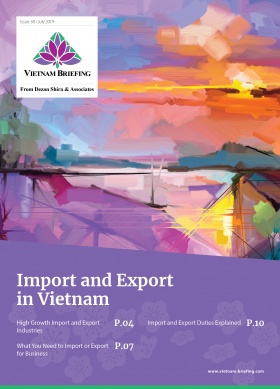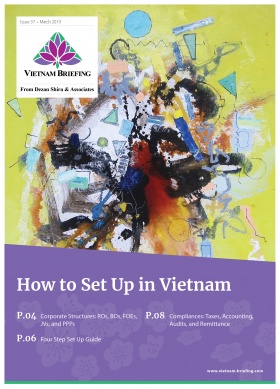Vietnam Introduces Resolution to Deal with Origin Fraud and Transshipment
- Vietnam introduced Resolution 119/NQ-CP to address increasing cases of transshipment and origin fraud.
- The resolution aims to promote cooperation among government agencies and more stringent product origin checks.
- The move is in line with Vietnam’s desire to satisfy US rules of origin requirements and address the trade surplus with the US.
The Vietnamese government introduced Resolution 119/NQ-CP (Resolution 119) in December 2019 to address increasing cases of origin fraud and illegal transshipment. Origin fraud or transshipment is when exports from one country, such as China, are minimally processed or altered during a brief stop in a third country, such as Vietnam, and then re-exported as a product originating from that country.
Industries particularly susceptible to transshipment include textiles, seafood, agriculture, honey, steel, iron, aluminum, and timber.
With the resolution, the government hopes to enhance important trading partners’ trust in Vietnamese goods and regulations of the Vietnamese government in trade.
Origin fraud and transshipment cases
Origin fraud became more widespread in 2019. According to the Trade Remedies Authority of Vietnam, there were 20 investigations of products under suspicion of origin fraud. Particularly, steel exports were investigated in six of those 20 cases.
In October 2019, US$4 billion of aluminum shipment was seized by Vietnam Customs, which was on its way to the US and other countries. While only 15 percent of tax is levied on Vietnam’s aluminum exports to the US, China’s are subject to 374 percent. This is just one of many cases of origin fraud in Vietnam as a result of the US-China trade war.
The General Department of Vietnam Customs pointed out two main reasons for the prevalence of origin fraud.
First, Vietnam’s legal requirement for application of certificate of origin (CO) is not comprehensive enough and the penalty mechanism has little preventive power. Currently, businesses that commit origin fraud are only fined with VND200 million (US$8,625), while they can earn millions on each shipment.
Second, as some countries (including the US) allow exporters to certify and declare the imports’ origin themselves (without any further inspection from the authority), some firms take advantage of this to commit origin fraud outside Vietnam’s territory.
Origin fraud can have a significant determinantal effect on compliant businesses and consumers’ trust in products and services. It can even hinder the prospects of Vietnam joining other free trade agreements (FTAs) due to distrust from trading partners.
In light of Vietnam’s participation in FTAs such as the Comprehensive and Progress Agreement for Trans-Pacific Partnership (CPTPP) and Vietnam-EU FTA (EVFTA), the Ministry of Industry and Trade, Ministry of Finance, Vietnam Chamber of Commerce and Industry (VCCI) and General Department of Vietnam Customs came up with Resolution 119 to address the issue.
Resolution 119
Resolution 119 aims to promote cooperation among ministries in information sharing and the product inspection process. We highlight five main points of the resolution.
- Related ministries are in charge of monitoring, publicizing and updating information of export goods that are under investigation for origin fraud. The ministries would pay close attention to specific categories of goods which simultaneously have a sudden increase in both import and export. The Trade Remedies Authorities also announced 25 items that need trade remedies investigation, such as plywood, electric bicycles, steel.
- The Ministry of Industry and Trade (MoIT) should soon introduce policies to encourage research and development and to attract foreign direct investment into the supporting industry, which is striving for a higher localization rate. Higher localization rates in the products would entitle exporters to preferential CO, which allows them to pay lower or no customs duty under relevant FTAs or the Generalized Schemes of Preference (GSP).
- Vietnam Customs still allows exporting firms to certify the products’ origin themselves, and then submit the CO online to the Customs Department. However, the authority would tighten their control over the CO and raise the frequency of their inspection for these firms. Others would still follow the procedure stipulated in Decision 31/2018/ND-CP.
- International cooperation would be further promoted through agreements to monitor Vietnam’s goods outside Vietnam’s territory.
Resolution for sustainable trade
To ensure a transparent future for Vietnam’s international trade, firms also need to proactively adhere to exporting guidelines and make proactive decisions about the production of goods for export.
The new regulations will hopefully ensure the sustainable development of Vietnam’s global trade and rights of businesses that are compliant. This is imperative given Vietnam’s participation in several FTAs and bilateral agreements which entail applicable guidelines on rules of origin.
If the issue is not addressed, Vietnam could face slower export procedures and outright tariffs and duties, hampering the country’s export-oriented economy.
About Us
Vietnam Briefing is produced by Dezan Shira & Associates. The firm assists foreign investors throughout Asia from offices across the world, including in Hanoi and Ho Chi Minh City. Readers may write to vietnam@dezshira.com for more support on doing business in Vietnam.
- Previous Article 3PL Networks in Vietnam: How to Engage Partners to Boost Sales
- Next Article EVFTA: Kampfansage an China?







